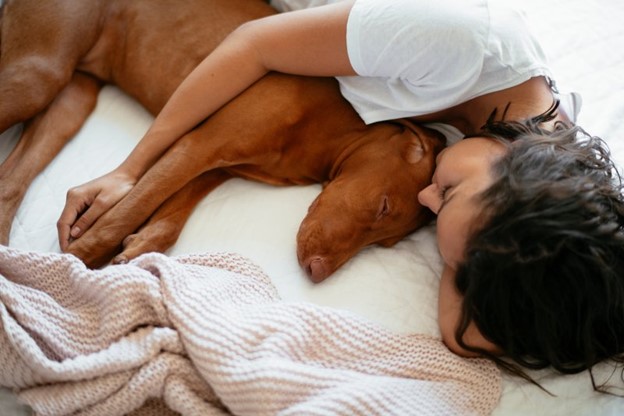Can Sleeping with My Pet Impact My Sleep Apnea?
July 1, 2022

It’s estimated that roughly 65% of American households own a pet—with cats and dogs being the most common choice of companion. And of those pet owners, many opt to allow their furry friends to sleep in their bed with them at night. But did you know that this habit can actually impact your sleep apnea? Keep reading to learn more from your sleep dentist in Albuquerque about how sleeping with your pets might be contributing to the quality of your rest, along with some things that you can do about it.
Are There Benefits to Sleeping with Your Pet?
According to a study conducted by the Center for Sleep Medicine, 41% of pet owners claim that their pets aren’t disruptive at all during the night. In fact, most of these owners claimed that their pets offered companionship, security, relaxation, or warmth throughout the night—all of which are some pretty great benefits. However, it’s important to note that not everyone surveyed allowed their pet to sleep in the bed with them; sometimes a separate bed in the same room was used, and one factor that contributes to sleep efficacy is whether or not the bed is being shared. Simply put, sleep is dependent on both physical and mental relaxation, and pets can sometimes be the catalyst for this!
How Does Sleeping with My Pet Affect My Sleep Apnea?
Despite the noticeable advantages of sleeping with pets, there are also observable disadvantages—mainly, the impact it has on sleep apnea. Obstructive sleep apnea (OSA), one of the most common types of sleep apnea, is characterized by partial blockage of the airway during sleep. This is often caused by the soft tissues of the throat and mouth closing, which can stem from a variety of reasons. However, pet dander can also contribute to OSA! Your body already has enough trouble breathing while you’re asleep if you suffer from sleep apnea, so adding pet hair into the equation will usually make matters worse. It’s also worth mentioning that animals don’t share the same sleep cycles as humans, meaning that as your pets stir and move throughout the night, your sleep will likely also be impacted.
Tips for Minimizing Your Pet’s Impact on Your Sleep
Fortunately, there are a few things you can do to reduce the impact that your pet has on your sleep:
- Create a comfortable space for your pet to sleep that isn’t on your bed.
- Regularly wash your bedsheets, vacuum or sweep your bedroom floor, and wipe down hard surfaces to reduce the amount of present dander.
- Keep your pet groomed and bathed.
- Take allergy medication if necessary.
- Seek sleep apnea therapy; sleep studies are non-invasive and can provide you with a diagnosis that allows you to seek sleep apnea treatment.
Many people can’t fathom not sleeping with their pet; but unfortunately, the impact that this habit has on sleep apnea is too important to ignore. That said, seeking sleep apnea treatment and taking the proper steps to improve your quality of rest can ensure that you and your furry friend are able to sleep soundly all night long.
About the Author
Dr. Eric Coontz is honored to serve patients and families in the Albuquerque area. Dr. Coontz received his dental doctorate from the Loyola University School of Dentistry in Chicago and maintains active membership in several professional organizations including the American Academy of Sleep Medicine and Diplomate status in the American Sleep and Breathing Academy. His practice is proud to offer a wide range of available treatment options including sleep apnea therapy. If you have any questions about sleep apnea or would like to schedule a visit, feel free to contact Dr. Coontz online or over the phone: (505) 433-2107.
No Comments
No comments yet.
RSS feed for comments on this post.
Sorry, the comment form is closed at this time.
